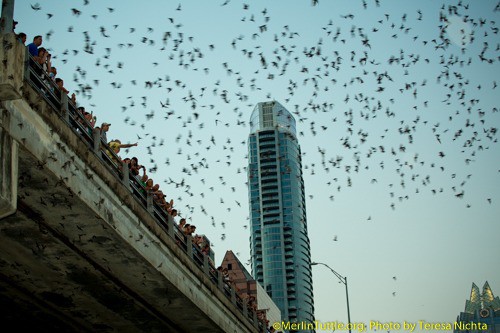Tracking the Impacts of WNS at Wisconsin’s Stonefield Historic Site
“Just like the old days, eh Heather?” Kent softly clicks his tally counter as he sits in his folding chair on the other side of
Every year around this time there is a spike in needlessly sensational rabies stories featuring exaggerations of truth. We always encourage others to respond politely to editors, authors, decision makers and media personnel when they see these. Editors’ jobs depend on readership and they do aim to please. They just need to know you like or dislike an article. Responses can be very simple such as, “I don’t appreciate sensational headlines or speculation that creates needless fear of bats.”
We work hard to be a source for your personal ambassadorship of bats and wish we could respond to every article, however our resources are limited. We cannot do it alone. We hope that this post will supplement your future responses when you encounter false or exaggerated bat publicity.
Unfortunately, this well intended story is a sensational exaggeration of truth. It is correct to say that most human rabies in America comes from bats. However, put in context, it’s just 1-2 cases per year, making it one of the rarest causes of death. By comparison, just by riding one mile in a motorized vehicle, an American exceeds his/her annual risk of rabies from any source.
Because even sick bats almost never bite, except in self-defense if handled, the risk of contracting any disease from one is exceedingly low for anyone who simply leaves them alone. In Austin, Texas, thousands of people gather nightly to observe the spectacular emergences of 1.5 million bats close-up. And in decades of this exceptionally close association, no one has been attacked or contracted a disease.
Post-exposure rabies vaccinations in the United States are outrageously overpriced, currently costing from $10,000 to $22,000 per person treated. With huge profits at stake, and our CDC heavily influenced by drug companies, promotion of exaggerated fear is not surprising. Unprovoked bites are exceedingly rare, so much so that I have yet to experience one despite close association with millions of bats worldwide for more nearly 60 years.
Human rabies cases are often diagnosed post-mortem or after the patient is incoherent. Even in cases in which parents or friends report bites, the U.S. CDC reports “no bite history” unless the patient is able to confirm. Consequently, human cases, regardless of animal origin (i.e. bat, dog, skunk or raccoon) often get reported as having no bite history. Huge misrepresentation occurs when such reports are used to disproportionately frighten people of bats.
Since 1996 the CDC Advisory Committee on Immunization Practices has advised consideration of post-exposure prophylaxis for “persons potentially exposed to bats even where a history of physical contact cannot be elicited,” unless prompt diagnosis excluded rabies. Based on its independent analysis Canada’s National Advisory Committee on Immunization, opted not to follow CDC’s recommended bat policy. They do not advise vaccination unless there has been direct contact. For detailed documentation, see Rabies in Perspective.

Love our content? Support us by sharing it!
“Just like the old days, eh Heather?” Kent softly clicks his tally counter as he sits in his folding chair on the other side of
An important new study, recently published in Science and widely covered by major newspapers like The Guardian, The Washington Post, and The New York Times, has
It’s summertime (in the Northern Hemisphere) and the evening skies are alive with activity. As the sun sets, bugs are flying around and bats are
On March 6, 2024, the Wall Street Journal presented findings from the University of Leeds in their opinion piece, “Why Scientists Love Chasing Bats; The
2024 © Merlin Tuttle’s Bat Conservation. All rights reserved.
Madelline Mathis has a degree in environmental studies from Rollins College and a passion for wildlife conservation. She is an outstanding nature photographer who has worked extensively with Merlin and other MTBC staff studying and photographing bats in Mozambique, Cuba, Costa Rica, and Texas. Following college graduation, she was employed as an environmental specialist for the Florida Department of Environmental Protection. She subsequently founded the Florida chapter of the International DarkSky Association and currently serves on the board of DarkSky Texas. She also serves on the board of Houston Wilderness and was appointed to the Austin Water Resource Community Planning Task Force.
Michael Lazari Karapetian has over twenty years of investment management experience. He has a degree in business management, is a certified NBA agent, and gained early experience as a money manager for the Bank of America where he established model portfolios for high-net-worth clients. In 2003 he founded Lazari Capital Management, Inc. and Lazari Asset Management, Inc. He is President and CIO of both and manages over a half a billion in assets. In his personal time he champions philanthropic causes. He serves on the board of Moravian College and has a strong affinity for wildlife, both funding and volunteering on behalf of endangered species.